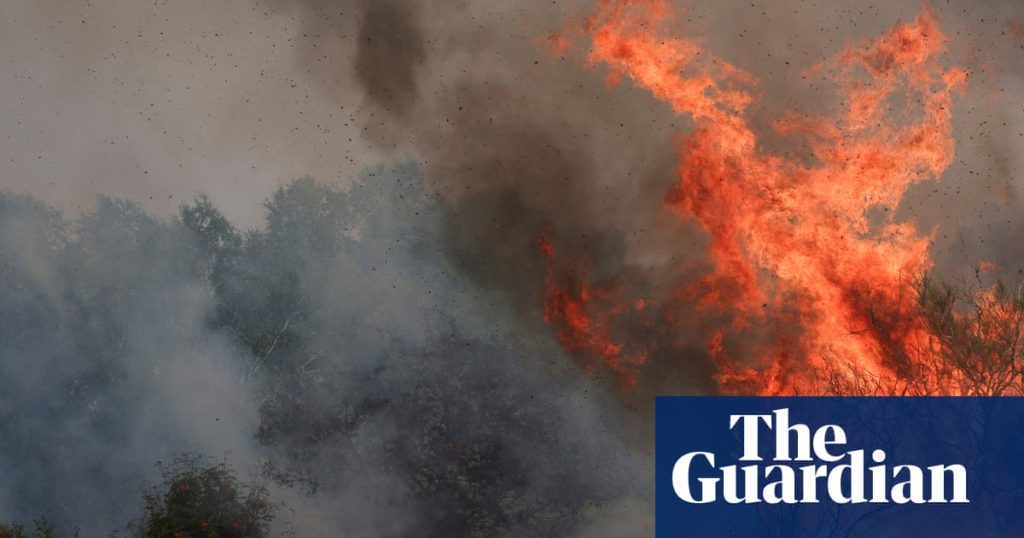The heatwave-fuelled wildfires that have killed two people in Spain over recent days, devouring thousands of hectares of land and forcing thousands of people from their homes, are a “clear warning” of the impact of the climate emergency, the country’s environment minister has said.
Speaking on Wednesday morning, as firefighters in Spain, Greece and other Mediterranean countries continued to battle dozens of blazes, Sara Aagesen said the 14 wildfires still burning across seven Spanish regions were further proof of the country’s particular vulnerability to global heating.
Aagesen said that while some of the fires appeared to have been started deliberately, the deadly blazes were a clear indicator of the climate emergency and of the need for better preparation and prevention.
“The fires are one of the parts of the impact of that climate change, which is why we have to do all we can when it comes to prevention,” she told Cadena Ser radio.
“Our country is especially vulnerable to climate change. We have resources now but, given that the scientific evidence and the general expectation point to it having an ever greater impact, we need to work to reinforce and professionalise those resources.”
Aagesen’s comments came a day after temperatures in parts of southern Spain surged past 45C (113F). The state meteorological office, Aemet, said there were no recorded precedents for the temperatures experienced between 1 August and 20 August.
A 35-year-old volunteer firefighter died on Tuesday in the north-western Spanish region of Castilla y León, where fires have prompted the evacuation of 5,000 people. His death came hours after that of a 50-year-old man who suffered 98% burns while trying to save horses from a burning stable near Madrid on Monday night. By Wednesday morning, the Madrid fire had been brought under control, but blazes in the Ourense province of Galicia had consumed 7,000 hectares of land.
“Emergency teams are continuing to fight fires across our country,” the prime minister, Pedro Sánchez, said in a post on X on Wednesday. “The fire situation remains serious and extreme caution is essential. My thanks, once again, to all of you who are working tirelessly to fight the flames.”
In Greece, which requested EU aerial assistance on Tuesday, close to 5,000 firefighters were battling blazes fanned by gale-force winds nationwide. Authorities said emergency workers were waging a “a titanic battle” to douse flames still raging through the western Peloponnese, in Epirus further north, and on the islands of Zakynthos, Kefalonia and Chios, where thousands of residents and tourists have been evacuated from homes and hotels.
Local media reported the wildfires had decimated houses, farms and factories and forced people to flee. Fifteen firefighters and two volunteers had suffered burns and other injuries including “symptoms of heat stroke”, the fire service said.
Around midnight a huge blaze erupted on Chios, devouring land that had only begun to recover from devastating wildfires in June. As the flames reached the shores, the coastguard rushed to remove people on boats to safety.
On the other side of Greece, outside the western city of Patras, volunteers with the Hellenic Red Cross struggled to contain infernos barrelling towards villages and towns. By lunchtime on Wednesday, media footage showed flames on the outskirts of Patras, Greece’s third-largest city. Municipal authorities announced a shelter had been set up to provide refuge, food and water for those in need. Seventeen settlements around Preveza, where fires broke out Tuesday, were reported to be without electricity or water.
“Today is also expected to be very difficult as in most areas of the country a very high risk of fire is forecast,” a fire service spokesperson, Vassilis Vathrakoyiannis, said in a televised address. “By order of the head of the fire brigade, all services nationwide, including civil protection forces, will be in a state of alert.”
At first light, 33 water-dumping planes and helicopters scrambled to extinguish fires, he said.
Temperatures exceeding 35C (95F) are predicted, according to some meteorologists, to rise further later this week, the height of the summer for Greeks. Record heat and prolonged drought have already turned much of the country tinder-dry, producing conditions ripe for forest fires.
A forestry worker was killed on Wednesday while responding to a wildfire in southern Turkey, officials said. The forestry ministry said the worker died in an accident involving a fire truck that left four others injured.
Turkey has been battling severe wildfires since late June. A total of 18 people have been killed, including 10 rescue volunteers and forestry workers who died in July.
In southern Albania a wildfire caused explosions after detonating buried second world war-era artillery shells. Officials said on Wednesday an 80-year-old man had died in one blaze south of the capital, Tirana.
The Associated Press contributed to this report

